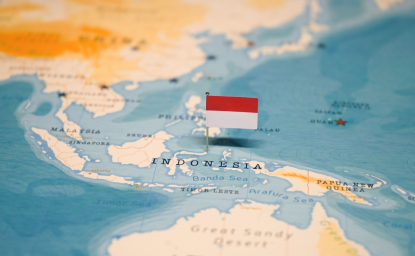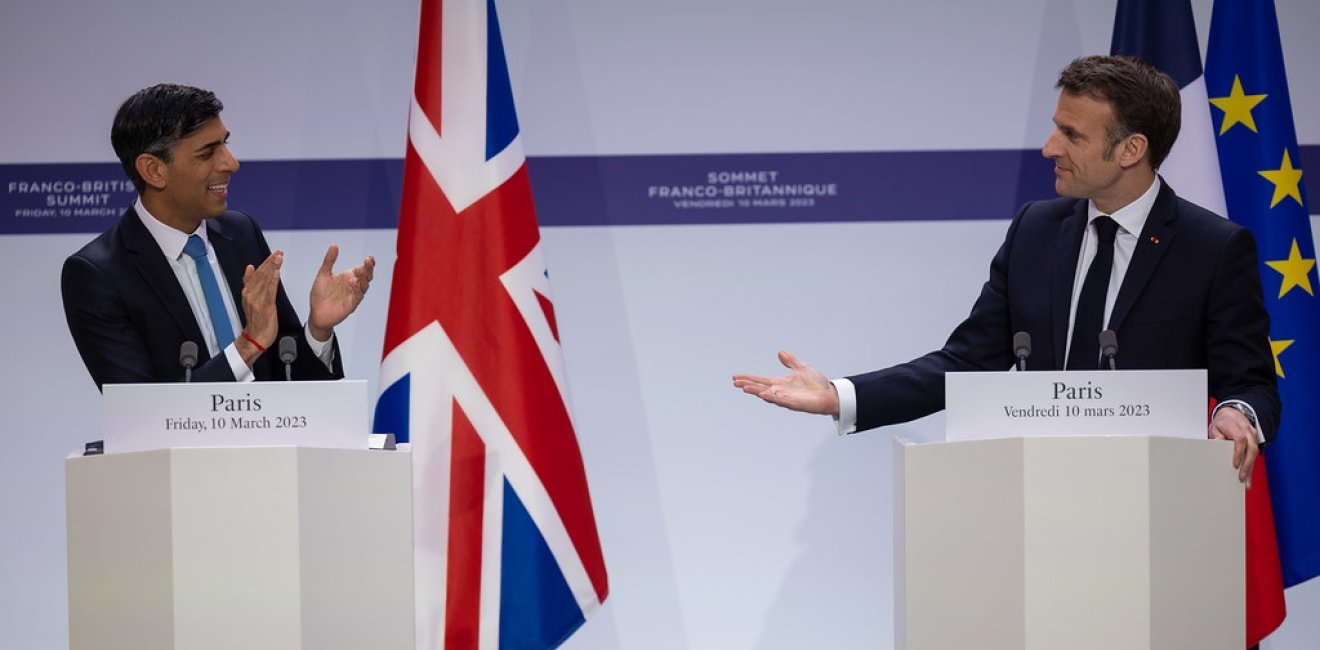For the first time in five years, a bilateral summit was held on March 10 between France and the United Kingdom, ushering in a new chapter of closer cooperation after years of political acrimony. French President Macron called the summit “a moment to reconnect” before announcing new areas of cooperation between his country and the UK in energy security, irregular migration, and Europe’s role in the Indo-Pacific. Although this meeting helped usher in a promising new chapter in bilateral relations for the UK and France, there is much work ahead for the two most advanced European militaries and Europe’s two permanent members of the UN Security Council to address the global challenges facing the two nations.
Frayed relations in recent years
The positive relationship on display at the summit comes hard-earned after several years of turbulence in UK-France relations. Much of this turbulence can be attributed to 1) fallout from the Brexit negotiations and 2) the AUKUS trilateral security pact that upended years of French efforts to provide Australia with its submarine technology. Brexit took up much of the bandwidth between London and continental Europe as negotiations dragged on longer than expected. Macron took an especially hard line in the Brexit negotiations on the side of the EU, notably in a major spat over perceived deviations in the UK’s post-Brexit trade deal with the EU. As a further sign of how drawn out the Brexit deal has become, the EU and the United Kingdom only recently reached a settlement on the status of Northern Ireland for trade relations with the EU, the Windsor Framework. After years of bitter feelings over the terms and technicalities of Brexit and the short-lived tenure of his predecessor, UK Prime Minister Sunak is now looking for allies in European capitals and seeking to demonstrate he is a reliable interlocutor. Sunak and Macron appear to have gotten along quite well – both come from a similar investment career background and are young, dynamic leaders. A strong personal relationship could help smooth over previous lows. Although Macron initially got along well with UK Prime Minister Boris Johnson, relations soured over Brexit trade spats. Then the damage from the AUKUS announcement dashed any hopes of a reset in relations that was promised at the G7 Summit in Cornwall in 2021.
The fallout from AUKUS on UK-France relations might no longer have been on display during the summit in Paris, but France is unlikely to forget the transgression. The AUKUS pact, a trilateral security arrangement between the United States, the United Kingdom, and Australia, was announced without France’s prior knowledge and undermined a deal struck between France and Australia in 2016 for a dozen submarines valued at $40 billion, likely worth more today, in what was commonly described as the “contract of the century” for France. The betrayal France felt at the hands of its allies led to Paris recalling its ambassador from Washington for the first time in the bilateral relationship between the two countries, the ultimate sign of diplomatic discord. In new details surrounding the nuclear submarine deal unveiled by the White House, Australia will buy three Virginia class nuclear-powered submarines with the option to buy two more, becoming the second country after the UK to receive Washington’s nuclear propulsion technology. Although this agreement has benefitted U.S. and NATO Alliance security in the Pacific, much to the open frustration of Chinese officials, Australia’s decision to renege on its submarine deal with France had a profound impact on UK-France relations. The wound may have healed, but a scar remains.
The global implications of UK-France cooperation
The UK-France summit demonstrated the enduring need for greater cooperation between the two nations in order to respond to new and old challenges. The largest announcement came in the form of joint cooperation on irregular migration and the funding of a new detention center in Dunkirk, to dissuade small boats from crossing the Channel. However, it was criticized by many as simply not enough to stem the growing number of irregular migrants nor solve the root causes driving migration. More than 45,000 people arrived in the UK by boat in 2022, up from 28,000 in 2021. Closer cooperation between France and the UK might help reduce these numbers, but adding more detention facilities in Northern France seems like a stopgap and fails to address the root drivers of displacement.
The two leaders extensively discussed the ongoing Russian invasion of Ukraine. Two energy agreements were signed at the summit to reduce France and the UK’s reliance on Russia as an energy provider “so that never again can the likes of Putin weaponise our energy security." On the European Political Community, Macron’s high-level vehicle to deepen European strategic dialogue with partners such as Ukraine and Moldova, the UK pledged to continue to participate. The UK and France are top supporters of Ukraine’s fight against Russian aggression. Closer ties between Sunak and Macron will ultimately benefit support for Ukraine.
It has been a busy few weeks for UK defense officials. First, Sunak shored up relations with Macron in Paris; then the UK launched its 2023 Integrated Review Refresh shortly after the Macron-Sunak summit that offered insight into the UK’s future plans for defense cooperation, followed by Sunak traveling to San Diego to unveil details of the AUKUS deal alongside U.S. President Biden and Australian Prime Minister Albanese. Sunak committed to maintaining close military cooperation in both “standing up for our values from Ukraine to the South China Seas.” Macron and Sunak discussed a permanent European maritime presence in the Indo-Pacific by coordinating the deployment of France’s Charles de Gaulle and the UK’s Queen Elizabeth and Prince of Wales aircraft carriers. Several European nations aspire to have a global presence in the Indo-Pacific, both as a means of power projection and support for allies’ engagement with China. The timing of this new era in France-UK relations is opportune to support the UK’s goals in the Indo-Pacific, as France is highly active in the region, in part due to its 2 million citizens in Polynesia. A pooling of resources will help ensure Europe continues to play a role in maintaining the values and security of the Indo-Pacific while not misallocating resources needed in Ukraine’s fight against Russia. The increased cooperation between Macron and Sunak on display at this summit might lead to more announcements about joint European initiatives in the Indo-Pacific.
The summit between France and the UK ushers in a new era in their bilateral relationship and is long overdue. Critically, this re-engagement comes at a time when the challenges to both countries are multiplying and greater cooperation is needed in response. A stronger France-UK partnership is necessary to address the global challenges facing Europe.
Author


Global Europe Program
The Global Europe Program is focused on Europe’s capabilities, and how it engages on critical global issues. We investigate European approaches to critical global issues. We examine Europe’s relations with Russia and Eurasia, China and the Indo-Pacific, the Middle East and Africa. Our initiatives include “Ukraine in Europe”—an examination of what it will take to make Ukraine’s European future a reality. But we also examine the role of NATO, the European Union and the OSCE, Europe’s energy security, transatlantic trade disputes, and challenges to democracy. The Global Europe Program’s staff, scholars-in-residence, and Global Fellows participate in seminars, policy study groups, and international conferences to provide analytical recommendations to policy makers and the media. Read more

Explore More
Browse Insights & Analysis
A Case for a North American Common Tariff

Ukrainian Issue in Polish Elections


